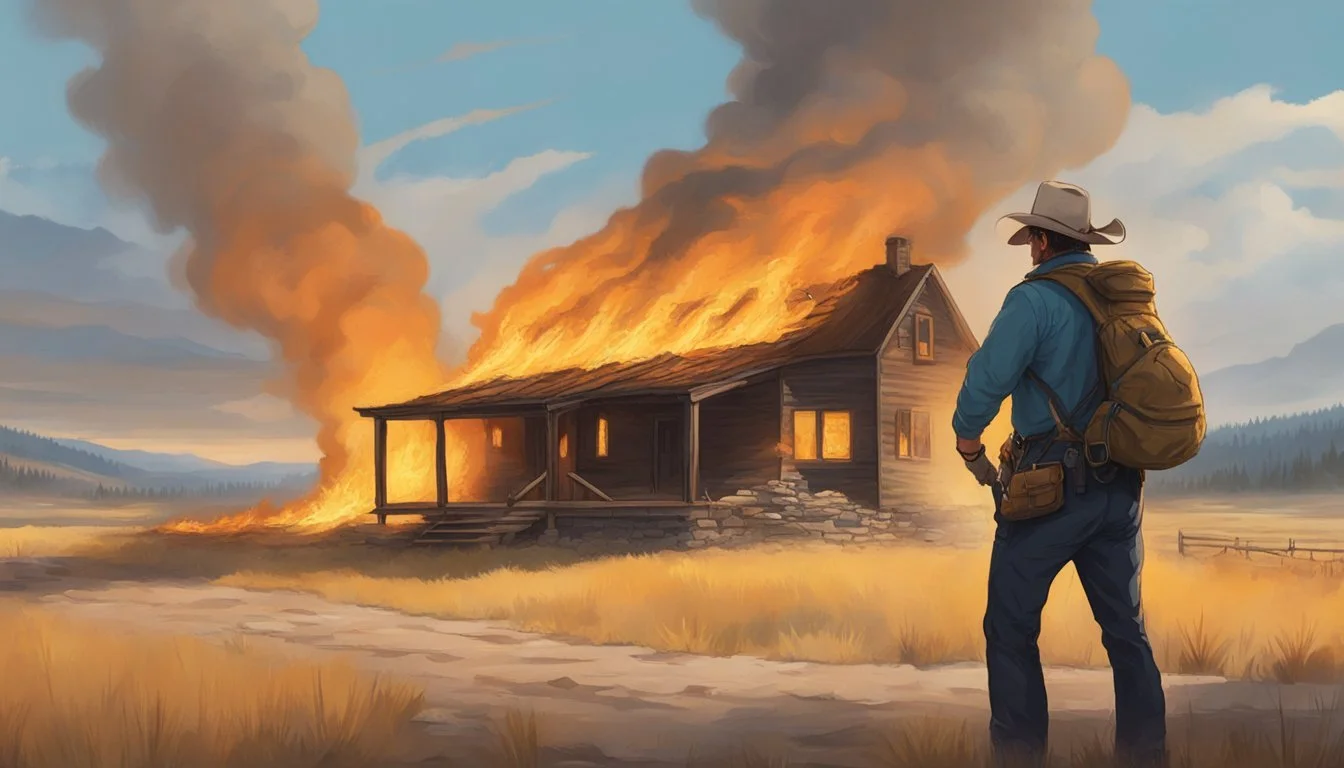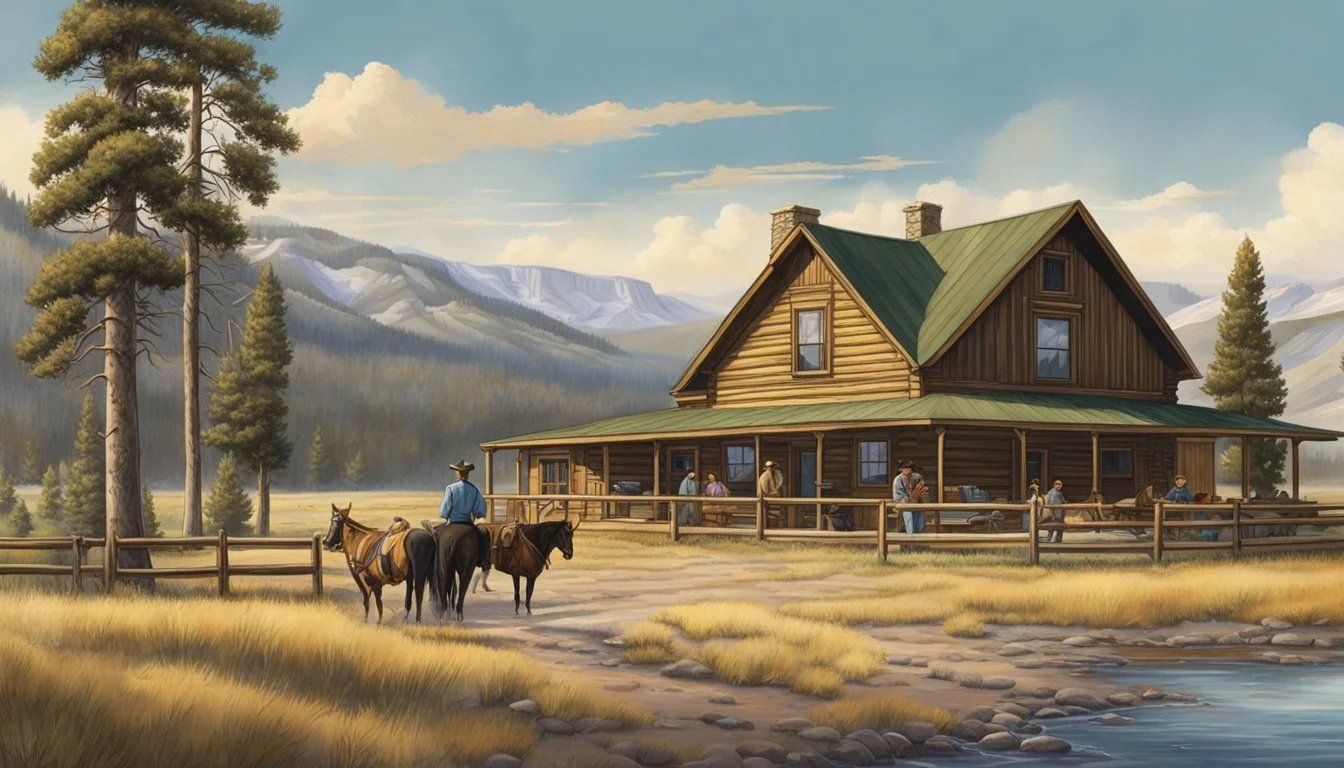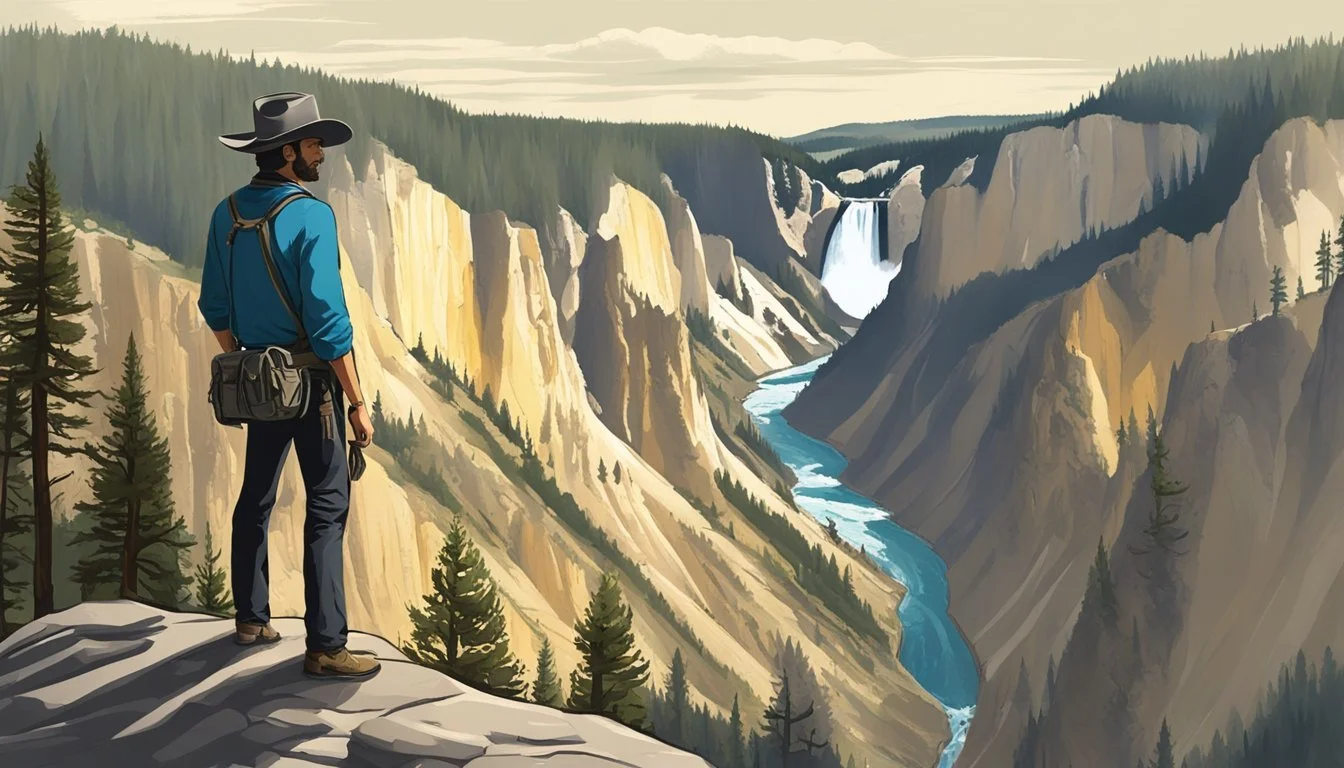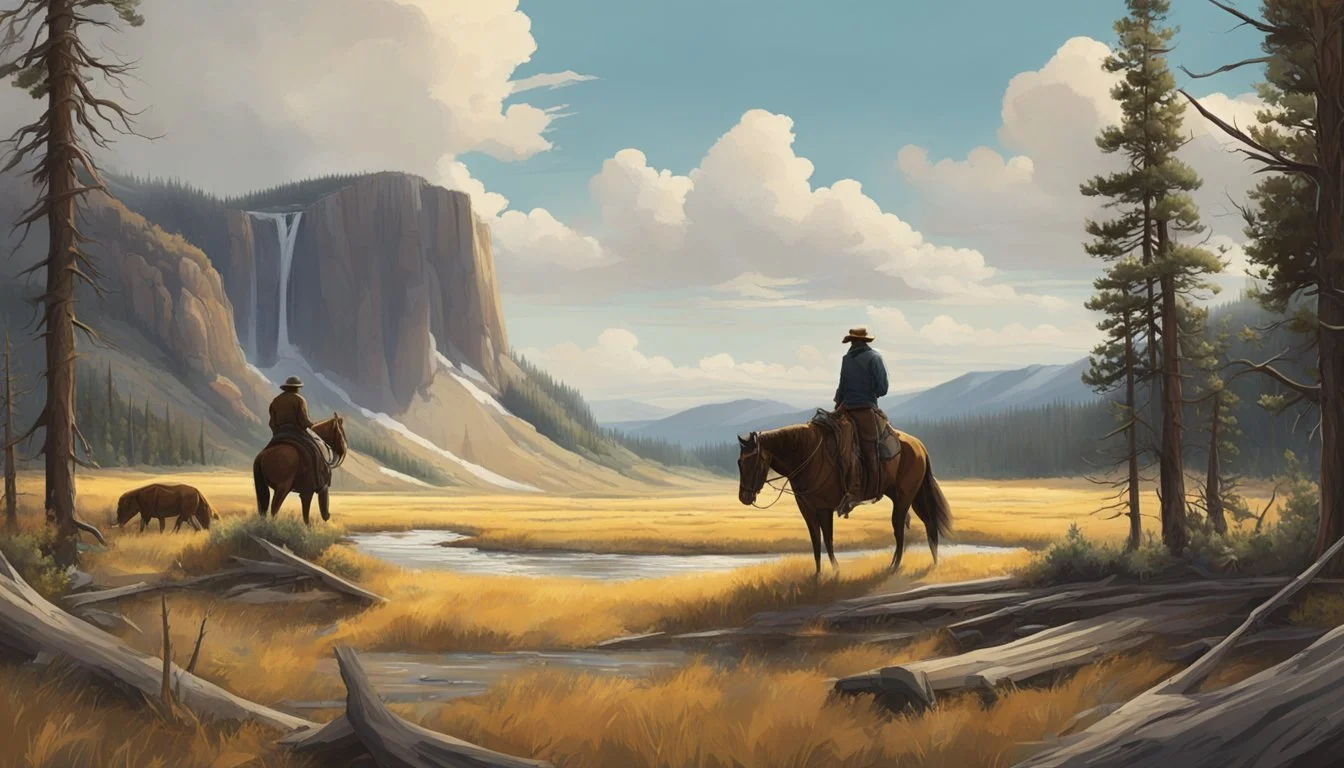Rip Yellowstone: The Shocking Truth Behind His Fiery Fate in the Final Season!
Rip Wheeler is an iconic character from the hit TV series Yellowstone. As the loyal ranch foreman and enforcer for the Dutton family, Rip plays a crucial role in protecting the Yellowstone Dutton Ranch. His unwavering dedication to John Dutton and fierce love for Beth Dutton make him a fan favorite and integral part of the show's dynamic.
Rip's complex backstory and development throughout the series captivate viewers. From his troubled past to becoming John Dutton's right-hand man, Rip's journey is marked by loyalty, toughness, and redemption. His relationship with Beth Dutton adds depth to his character, showcasing a softer side beneath his rugged exterior.
As Yellowstone nears its conclusion, speculation grows about potential spin-offs featuring beloved characters. Rip and Beth's story may continue beyond the original series, with hints of a new life on a ranch outside Dillon, Montana. This development opens up exciting possibilities for fans eager to follow the next chapter in Rip's compelling saga.
The Dutton Family Legacy
The Dutton family's influence extends across generations, shaping the fate of the Yellowstone Ranch. Their complex relationships and power struggles have defined the ranch's history and future.
John Dutton III's Leadership
John Dutton III, portrayed by Kevin Costner, stands as the formidable patriarch of the Dutton family. His unwavering commitment to preserving the ranch drives many of the show's conflicts. John's leadership style blends ruthlessness with a deep sense of duty to the land and his family's heritage.
He faces constant threats from developers, politicians, and rival ranchers seeking to claim parts of the Yellowstone. John's strategic mind and willingness to bend rules ensure the ranch's survival against mounting odds.
His relationships with his children are often strained as he grooms them to continue the family legacy. John's complex character embodies the struggle between tradition and progress in the modern American West.
Relationship Dynamics
The Dutton family's internal relationships are as tumultuous as their external conflicts. Loyalty and betrayal often intertwine, creating a web of alliances and rivalries.
John's children - Jamie, Beth, and Kayce - each play crucial roles in the family's operations. Their sibling rivalries and individual ambitions frequently clash with their father's vision for the ranch.
Rip Wheeler, John's loyal ranch hand and Beth's love interest, adds another layer to the family dynamics. His unwavering dedication to John and the ranch makes him an adopted son in all but name.
These intricate relationships form the emotional core of the Yellowstone saga, driving much of the drama and character development throughout the series.
Beth Dutton's Role
Beth Dutton, played by Kelly Reilly, emerges as a fierce protector of the family legacy. Her sharp intellect and ruthless business acumen make her a formidable adversary to anyone threatening the ranch.
As John's most trusted advisor, Beth orchestrates complex financial maneuvers to safeguard the Yellowstone's interests. Her confrontational style and strategic thinking often put her at odds with both family members and external foes.
Beth's traumatic past shapes her actions, fueling her loyalty to her father and her determination to secure the ranch's future. Her relationship with Rip adds depth to her character, revealing vulnerability beneath her tough exterior.
Her role in the family business highlights the evolving nature of power and gender dynamics in the modern ranching world.
Rip Wheeler's Character Arc
Rip Wheeler's journey on Yellowstone showcases his evolution from a ruthless enforcer to a respected leader. His unwavering loyalty, complex relationship with Beth, and moral ambiguity make him a captivating character.
From Enforcer to Foreman
Rip Wheeler starts as the Dutton family's enforcer, handling their dirty work with brutal efficiency. His intimidating presence and willingness to do whatever John Dutton asks make him invaluable to the ranch.
As the series progresses, Rip takes on more responsibilities. He becomes the ranch foreman, leading the bunkhouse and overseeing daily operations. This promotion reflects John's growing trust in Rip's abilities.
Rip's leadership style blends toughness with fairness. He demands respect from the ranch hands but also earns their loyalty through his actions and work ethic.
Rip and Beth: A Complex Love Life
Rip's relationship with Beth Dutton forms a central part of his character development. Their love story is tumultuous, marked by passion and shared trauma.
The couple's history dates back to their teenage years. Despite setbacks and Beth's initial reluctance, their bond deepens throughout the series.
Rip's unwavering devotion to Beth contrasts with his tough exterior. He supports her through her struggles and accepts her flaws unconditionally.
Their marriage in later seasons represents a significant milestone in Rip's arc, solidifying his place in the Dutton family.
Loyalty and the Train Station
Rip's fierce loyalty to the Duttons is a defining trait. He views the family, especially John, as his saviors and would do anything to protect them.
This loyalty often leads Rip to commit violent acts. He becomes the primary executor of the Duttons' most dangerous tasks, including disposing of bodies at the infamous "train station."
Rip's involvement in these dark deeds highlights the moral complexity of his character. He grapples with the consequences of his actions while remaining steadfast in his commitment to the family.
As the series progresses, Rip's role in these activities evolves. He begins to question certain decisions and seeks ways to protect the ranch without resorting to extreme violence.
Yellowstone Ranch Operations
The Yellowstone Ranch operates as a vast, complex enterprise under the leadership of the Dutton family. Daily routines, a dedicated crew, and strict hierarchies form the backbone of this iconic Montana cattle operation.
Daily Life on the Ranch
Ranch hands rise before dawn to begin their daily tasks. Cattle drives, fence repairs, and pasture rotations keep the crew busy from sunup to sundown. Rip Wheeler, as foreman, oversees these operations with a firm hand.
Seasonal work like branding calves and preparing for winter intensifies the workload. The ranch also deals with unexpected challenges such as predator attacks or equipment failures.
Meals are often quick affairs, taken in the field or at the chuck wagon during busy periods. Despite long hours, the work fosters a strong sense of camaraderie among the hands.
The Bunkhouse Crew
The bunkhouse serves as home for most of the ranch hands. It's a simple structure with basic amenities, reflecting the no-frills lifestyle of working cowboys.
Lloyd, the senior ranch hand, often acts as a mentor to younger workers. Jimmy, a newcomer, learns the ropes under his guidance. Teeter, one of the few female hands, proves her worth through hard work and determination.
After long days, the bunkhouse becomes a place for relaxation and bonding. Card games, stories, and the occasional conflict are all part of life in these close quarters.
Ranch Hands and Hierarchies
A clear pecking order exists among Yellowstone's ranch hands. At the top sits Rip Wheeler, whose word is law on the ranch. His position as John Dutton's right-hand man cements his authority.
Below Rip are experienced hands like Lloyd, who command respect through their years of service. New recruits start at the bottom, earning their place through hard work and loyalty.
The hierarchy extends to work assignments. Senior hands often get more desirable or skilled tasks, while newcomers tackle the grunt work. This structure helps maintain order and efficiency on the sprawling ranch.
Dangers at the Yellowstone
The Yellowstone ranch faces numerous threats, both internal and external. Power struggles, betrayals, and shocking events keep the Dutton family constantly on edge.
Conflict and Power Struggles
The Dutton family's control over the Yellowstone ranch attracts powerful enemies. Land developers and rival ranchers seek to claim the valuable property for themselves. John Dutton, the family patriarch, must defend his legacy against these outside forces.
Within the ranch, tensions simmer between family members vying for control. Beth and Jamie Dutton's sibling rivalry often erupts into bitter confrontations. Kayce Dutton struggles to balance his loyalty to the family with his own ambitions.
Rip Wheeler, the ranch foreman, plays a crucial role in these power dynamics. His unwavering devotion to John Dutton makes him a formidable ally in conflicts.
Dealing with Treachery
Betrayal lurks around every corner at the Yellowstone ranch. The Duttons face constant threats from those they once trusted. Jamie Dutton's actions have put the family at risk multiple times.
Corporate interests attempt to infiltrate the ranch through bribery and manipulation. The family must remain vigilant against those who would sell them out for personal gain.
Rip Wheeler often takes on the role of enforcer, dealing with traitors in brutal fashion. His methods, while effective, sometimes create new dangers for the Duttons.
Season Finale Shocks
The Paramount Network series "Yellowstone" is known for its explosive season finales. These episodes often feature life-threatening situations for the main characters.
Assassination attempts on the Dutton family have become a recurring theme. The season 3 finale saw coordinated attacks that left multiple family members fighting for their lives.
Murder and violence escalate as the stakes grow higher with each passing season. Rip Wheeler frequently finds himself at the center of these deadly confrontations, protecting the family at all costs.
Viewers are left on the edge of their seats, wondering who will survive to see another season.
Ranch Life and Culture
Ranch life in Montana embodies a unique blend of tradition, hard work, and connection to the land. The cowboy culture depicted in Yellowstone reflects many authentic aspects of daily operations and values on working cattle ranches.
Rodeo and Training
Rodeo events play a significant role in ranch culture, showcasing skills essential for working cattle. Cowboys participate in calf roping, barrel racing, and bull riding competitions. These events not only entertain but also serve as practical training grounds.
Ranches like the fictional Yellowstone often host their own rodeos, bringing together neighboring families and communities. Young ranch hands hone their skills through these events, preparing for the demands of ranch work.
Training horses and riders is a continuous process on Montana ranches. Experienced cowboys mentor younger generations, passing down techniques for roping, herding, and horseback riding.
The Importance of the Horse
Horses are integral to ranch operations and hold a special place in cowboy culture. On vast Montana properties like the Dutton ranch, horses remain essential for traversing rough terrain and managing cattle.
Each cowboy develops a strong bond with their horse, often spending more time in the saddle than on foot. Ranches maintain stables of well-trained horses, each suited for specific tasks such as cutting cattle or long trail rides.
Horse care is a daily priority. Cowboys rise early to feed, groom, and exercise their mounts before the day's work begins. This dedication reflects the horse's status as both a working animal and a trusted companion.
Traditions and Values
Ranch life in Montana is steeped in traditions passed down through generations. Family plays a central role, with ranches often operated by multiple generations working side by side.
Core values include hard work, self-reliance, and respect for the land. Cowboys take pride in their ability to face challenges head-on, whether it's harsh weather or difficult livestock.
Community ties are strong in ranching areas. Neighbors often come together for brandings, cattle drives, and harvest celebrations. These events reinforce bonds and provide mutual support in times of need.
Ranches like those near Dillon, Montana, maintain a strong connection to cowboy heritage while adapting to modern challenges. Conservation efforts and sustainable land management practices are increasingly important to preserve the ranching way of life for future generations.
New Characters and Developments
The Yellowstone universe expands with fresh faces and evolving storylines. Carter matures into a key player, Kayce faces new trials, and Season 5 introduces intriguing additions to the cast.
Carter's Journey and Growth
Carter's role on the Dutton ranch has transformed significantly. Once a troubled youth, he's now an integral part of the family's operations. His bond with Beth and Rip has deepened, shaping him into a more responsible young man. Carter's newfound skills in ranching and horsemanship prove invaluable to the Duttons.
His journey reflects the show's themes of redemption and family. As he grows, Carter faces tough decisions about his future and place within the Dutton dynasty.
Kayce Dutton's Challenges
Kayce's path takes unexpected turns in recent episodes. His leadership abilities are tested as he balances family obligations with his role in the Dutton empire. Kayce's relationship with Monica faces strain, pushing him to reevaluate his priorities.
New threats emerge, forcing Kayce to confront enemies both old and new. His Native American heritage plays a crucial role in navigating complex political landscapes. Kayce's journey highlights the ongoing struggle between tradition and progress in Montana.
Season 5 Newcomers
Season 5 introduces fresh faces to the Yellowstone saga. Sarah Atwood, a corporate shark, challenges the Duttons' power. Her cunning tactics add a new layer of tension to the show's intricate plot.
Another addition is Rowdy, a young cowboy who stirs up trouble on the ranch. His presence creates ripples among the established characters, testing loyalties and alliances.
These newcomers bring dynamic energy to the series, injecting new conflicts and possibilities into the Yellowstone narrative. Their arrivals coincide with major shifts in the Dutton family's fortunes, setting the stage for gripping storylines.
Exploring the Setting
The rugged Montana landscape and iconic Dutton Ranch form the backdrop for Rip Wheeler's journey in Yellowstone. These settings shape the characters and drive the story forward.
Montana's Majestic Landscape
Montana's vast wilderness provides a stunning canvas for Yellowstone's drama. Towering mountains, expansive prairies, and winding rivers create a sense of isolation and raw beauty. This untamed terrain reflects the show's themes of survival and connection to the land.
The harsh climate tests the characters' resilience. Brutal winters and scorching summers mirror the emotional extremes they face.
Wildlife plays a crucial role, with encounters between humans and animals highlighting the delicate balance of nature. Wolves, bears, and bison serve as both threats and symbols of the wild spirit that permeates the series.
Significance of the Cabin
Rip's cabin serves as his sanctuary and a physical representation of his loyalty to the Duttons. Located on the ranch property, it symbolizes his role as both an outsider and an integral part of the family.
The cabin's rustic interior reflects Rip's no-frills personality. Its isolation underscores his solitary nature and dedication to his work.
Over time, the cabin transforms from a bachelor's retreat to a home shared with Beth. This change parallels Rip's personal growth and deepening connections.
Dutton Ranch as Home
The sprawling Yellowstone Dutton Ranch is more than just a setting—it's a character in its own right. As the largest contiguous ranch in the United States, it represents power, legacy, and the American dream.
For Rip, the ranch is the only true home he's ever known. It's where he found purpose and family after a troubled past. The ranch's daily operations showcase the gritty reality of modern cattle ranching.
The iconic lodge serves as the heart of the Dutton family. Its grand architecture and historical artifacts emphasize the weight of tradition that Rip helps uphold.
Threats to the ranch drive much of the show's conflict. Rip's fierce protection of the land stems from his deep-rooted belief that life itself is a promise to defend what matters most.
Cultural Impact and Reception
Yellowstone has left an indelible mark on American television and popular culture. The show's influence extends far beyond entertainment, shaping viewers' perceptions and sparking discussions about contemporary issues.
Public Perception and Fandom
Yellowstone's fanbase has grown exponentially since its 2018 debut. The series resonates with audiences across the United States, attracting viewers from diverse backgrounds. Social media platforms have become hubs for fan engagement, fostering a vibrant community where viewers discuss plot theories and share favorite moments.
The show's popularity has led to increased tourism in Montana and other Western states featured in the series. Fans often seek out locations from the show, boosting local economies.
Yellowstone-inspired fashion has also gained traction. Western wear, including cowboy hats and boots, has seen a resurgence in popularity among fans eager to emulate the characters' style.
Memorable Quotes and Scenes
Yellowstone is known for its sharp dialogue and powerful scenes. Fans often quote lines from the show, particularly those delivered by Kevin Costner's character, John Dutton. His no-nonsense approach and loyalty to the land resonate with viewers.
Some standout quotes include:
"Learn to be meaner than evil and still love your family and enjoy a sunrise."
"Leverage is knowing that if someone had all the money in the world, this is what they'd buy."
These lines encapsulate the show's themes of family, power, and connection to the land. Memorable scenes often involve intense confrontations or breathtaking shots of Montana's landscape.
Taylor Sheridan's Vision
Creator Taylor Sheridan's unique perspective shapes Yellowstone's narrative. His background in ranching and understanding of Western culture lends authenticity to the series. Sheridan's storytelling focuses on complex characters navigating modern challenges while holding onto traditional values.
The show tackles contemporary issues such as land rights, political corruption, and the clash between progress and tradition. Sheridan's vision extends beyond entertainment, aiming to shed light on the realities of modern ranching and rural American life.
Paramount Network's support has been crucial in bringing Sheridan's vision to life. The network's commitment to the series has allowed for high production values and expansive storytelling.
Behind-The-Scenes Insights
Yellowstone's authentic portrayal of ranch life is enhanced by its meticulous production details and dedicated cast. The show's creators and actors face unique challenges filming on location, resulting in a truly immersive viewing experience.
Production Details and Anecdotes
Yellowstone primarily films at the Chief Joseph Ranch in Darby, Montana. This 2,500-acre working cattle ranch serves as the iconic Dutton family property. The show's set designers work tirelessly to maintain authenticity, incorporating real ranch equipment and livestock into scenes.
Taylor Sheridan, Yellowstone's creator, insists on using actual cowboys as extras to ensure realistic depictions of ranch work. Many of the horses featured on screen belong to the actors themselves, adding a layer of genuine connection between the performers and their equine co-stars.
The production team often faces unpredictable weather conditions, sometimes having to adapt scripts on short notice to accommodate sudden changes in the Montana landscape.
Cast Interviews and Personal Stories
Cole Hauser, who plays Rip Wheeler, has shared insights into his preparation for the role. He spent time on working ranches to learn proper horseback riding techniques and cattle handling skills.
Kevin Costner, portraying John Dutton, has expressed his deep appreciation for the show's commitment to authenticity. He often consults with real ranchers to ensure his character's decision-making aligns with genuine ranch management practices.
Cast members have described the strong bonds formed during long hours on set, with many considering their co-stars as a second family. This closeness translates to the on-screen chemistry viewers enjoy.
Challenges of Filming on Location
Filming in remote Montana locations presents unique obstacles for the Yellowstone crew. Harsh weather conditions, including extreme cold and unpredictable storms, can delay production and require quick thinking from the team.
The show's commitment to using real ranch locations means working around active cattle operations. This sometimes leads to unexpected interruptions during takes, as the production must pause for actual ranch work to continue.
Transportation of equipment and crew to remote filming sites poses logistical challenges. The team often relies on specialized vehicles and local guides to access hard-to-reach areas, ensuring they capture Montana's breathtaking landscapes for viewers.




